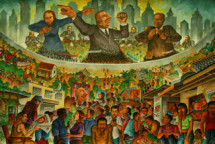Into the void: The loss of governance in rural Mexico
Topics
Regions
Why has populism remained an important political force within Mexico?

Authors
Mexican rurality has experienced many types of land tenure institutions from the Pre-Hispanic era to the present day. The relationship between these institutions and the State throughout the years has shaped the life of rural Mexico. The rurality as a product of the Mexican Revolution permitted the establishment of an authoritarian regime that lasted until the end of the 20th century. However, despite the political transition towards a democratic regime, rural governance structure in Mexico has become the space where new forms of resistance, violence, wild capitalism, development and underdevelopment coexist, creating an environment for the maintenance of a type of populism that ruled the country during the last century. To understand why populism has remained an important political force within the country, we must assess the characteristics and changes of the rural structure in Mexico.
The Mexican case of populism varies from the populism that is rising in Europe or the United States. First and most important, Mexican populism has not developed a sense of xenophobia. Second, the nationalist political movement that rises in these parts of the world has born in a more strong and consolidated democracy. Despite these differences, the Mexican experience could bring important insights on what elements must be considering when analyzing the rise of populism, either right or left, in the countryside. The land tenure system could be an important element of analysis to understand demand side of populism regarding peasant organization. For example, in the cases where peasants have communitarian forms of land tenure, they become more resilience to populism harassment. The strong organization of ejidos in Oaxaca, Quintana Roo and Chihuahua make ejidatarios a strong political actor in the local context, forcing the government to negotiate with them in more equal and democratic terms. On the contrary, ejidos where private property has become predominant, organization among ejidatarios decrease, making them an easy target for populism and clientelism.
On the supply side of populism, an important element to be considering when analyzing populism in rural areas is the relationship between the countryside and the State. The rural governance structure could be determinant in the rise of populism. In Mexico, the governance structure developed after the Mexican revolution led to the construction of an authoritarian populism that ruled the country for more than 70 years. The end of this type of governance through the 1992 reform did not bring a new institutional framework capable to rule - democratically - the rural areas. This has permitted the maintenance of PRI populism through clientelism and the rise of other types of populism represented by Vicente Fox and Andrés Manuel López Obrador. Therefore, the land tenure system and the rural governance structure are two forms strongly connected between populism and the countryside in Mexico. These elements could be considered and analyzed in other countries to understand how populism could rise and how it could be stopped. Many peasants had followed populist leaders and parties due to the abandonment of the government and political parties. To end with the right-wing populism, politicians, government and academia must focus on what changes rural areas have been through in the last decades to understand what factors could drive peasants to populist leaders or movements.
This paper was presented at the Emancipatory Rural Politics Initiative (ERPI) 2018 Conference: "Authoritarian Populism and the Rural World"